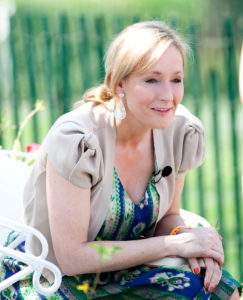 It’s been a surreal and somewhat disconcerting experience for the trans and trans-sympathetic community to see such a beloved (and otherwise moderately progressive) voice as Harry Potter author JK Rowling recently comparing the coming out and transition of transgender children with conversion therapy for gays. “Many, myself included, believe we are watching a new kind of conversion therapy for young gay people, who are being set on a lifelong path of medicalization that may result in the loss of their fertility and/or full sexual function,” Rowling wrote on Twitter.
It’s been a surreal and somewhat disconcerting experience for the trans and trans-sympathetic community to see such a beloved (and otherwise moderately progressive) voice as Harry Potter author JK Rowling recently comparing the coming out and transition of transgender children with conversion therapy for gays. “Many, myself included, believe we are watching a new kind of conversion therapy for young gay people, who are being set on a lifelong path of medicalization that may result in the loss of their fertility and/or full sexual function,” Rowling wrote on Twitter.
Conversion therapy, of course, is an involuntary process where children are forced to renounce their natural inclinations and alter who they’re attracted to; it’s the imposition of an invasive mental procedure upon a person purely against their will, while coming out as transgender, as every trans person knows, is a matter of deep personal freedom and bodily sovereignty. The two phenomena could not have less in common.
This discrepancy could easily be cleared up if Rowling would merely talk to experts or trans people, who could explain the difference for her in less than a minute. But Rowling apparently isn’t listening; she’s too busy publicly spreading the terrifying notion that “men in dresses” will invade public bathrooms and assault them, or coerce their sons and daughters to take harmful chemicals with irrevocable physical effects.
Rowling’s bathroom issues are, of course, with men, not with trans women. It doesn’t take donning a dress for a man to assault a woman, and of course the merest bit of internet research reveals that more Republican politicians have been arrested in acts of public bathroom mischief than trans folk. But facts don’t seem to matter to Rowling or other anti-trans activists. The most vocal of these activists, called TERFs (“trans-exclusionary radical feminists”) by their detractors, have lately taken the odd step of working hand in hand with right-wing extremists, who in other areas could be considered their arch-nemeses, to limit trans rights and spread harmful theories exactly like the ones in which Rowling is taking part. Apparently, the enemy of my enemy is my friend. That these radical feminists may have a surprise in store when their compatriots in exclusion eventually turn upon them apparently hasn’t occurred to anyone.
At any rate, if the worst is true, and a young child comes out as trans then decides they were in error, what is lost? It’s another phase, another purple hair and nail polish-era soon consigned to the photo album. Most transgender medications take months, if not years, to leave a mark, and are mostly reversible. Breast tissue is one of those, and as any boy with gynecomastia can attest (I was one) it’s not exactly fun but far from life-ruining.
On the other hand, coming out as trans is so difficult, so socially disruptive and turbulent, that it’s difficult to imagine doing it on a whim; mostly it comes after years of self-inspection and feeling internally incomplete or out of sorts. For younger children, it can only come as an internal orientation as obvious to them as the daylight in which they hope to authentically walk.
Personally, I’m slightly sympathetic to the idea that large trans women in women’s spaces may seem a little disconcerting to many: I get it. I’m over six feet tall, and weigh more than two hundred pounds; in my former life, I really was a linebacker. I use the women’s room sparingly, trying to not scare anyone or make anyone feel unwelcome in that most private of spaces. But the alternative is so much worse: physical beatings, “holding it” for hours, or even avoiding public spaces altogether. (On long car rides, I’ve gotten more acquainted than I ever wanted to with, ahem, “single-use plastic bottles”). Is it too much to ask that women allow these vulnerable, well-meaning individuals, who are among society’s very most persecuted, a space at the vanity?
That the otherwise progressive Rowling’s words are now being used by right wing politicians to further their campaigns of elimination was entirely predictable, and must give her pause. Being transgender is not “groupthink,” as Rowling has claimed, nor a fad; its sudden rise to cultural prominence is fueled primarily by the increase of connectivity all across the world, as isolated souls have discovered one another through social media and other outlets, and realized, with great relief, that they are not alone. There is no “trans-agenda” to indoctrinate anyone, let alone children. This is propagandist paranoia, straight and simple; we are simply scared and sensitive souls who now—after our fore-sisters and brothers fought so hard and so bravely for our rights—may have a chance at simply living in peace with our bodies and our culture at large.
It would seem appropriate for Rowling to listen to the scientists and experts, but sadly, she’s done anything but. Mostly, according to Vanity Fair’s Grace Robertson, a British trans writer, she’s listened to the hyper-vocal British TERF’s who are still mired in racism and homophobia, the ones with an aggressive agenda to oust trans women from any single-sex spaces, and, also, public acceptance. It’s a sad legacy that leaves her own work tarnished, keeps trans children from claiming their true identities, and forces trans women to continue making unfortunate use of single-use plastic bottles all over the world.
 Polly Schattel is a member of Women AdvaNCe’s Board and a filmmaker and writer based in Asheville, NC. Find her at www.newsouthernfilms.com.
Polly Schattel is a member of Women AdvaNCe’s Board and a filmmaker and writer based in Asheville, NC. Find her at www.newsouthernfilms.com.

Polly, I am a transgender woman writer. I was horrified by Rowling‘s words and I have been considering a written response myself. Yours is so perfectly written, I can add nothing further. It is succinct, complete and professional. Thank you for your work. Stay safe and strong and have a Wonder Woman day.
Thank you for this. It’s important, and beautifully written.
Perfectly stated and explained. Thank you for excellent work, Polly.